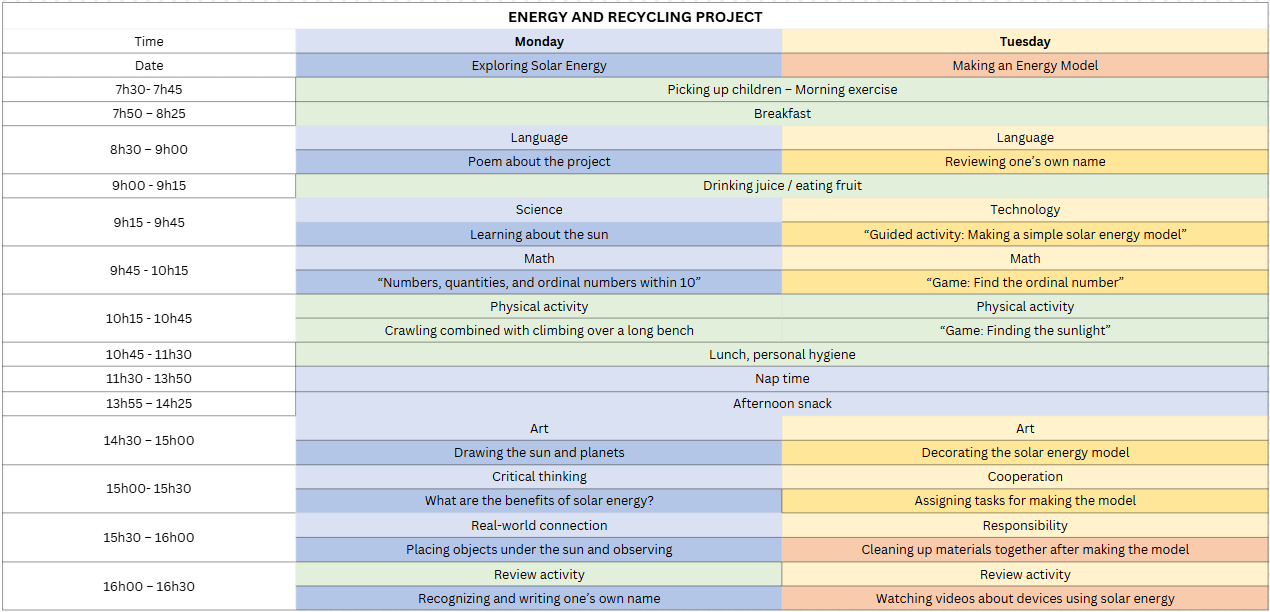KINDERGARTEN 2 (5–6 years) – Independent Learning & Applying Knowledge to Real Life
Children understand the different learning/play areas and rooms in the school and know how to use tools and toys properly. They develop a sense of responsibility: cleaning up and returning items after play; understanding and following class and school rules; maintaining environmental cleanliness by not littering; and applying knowledge to real-life situations.
Activity Details by Learning Area

Cognitive and Thinking Skills (STEAM)
Science
Learn the purposes and correct use of tools and toys effectively; conduct simple experiments, observe, and record processes.
Technology
- Week 1: Use a tablet to create a simple presentation about their classroom.
- Weeks 2–4: Record videos of lessons/class/school (practicing visual storytelling).
(Guidance on using digital devices safely and purposefully instead of prohibiting them.)
Engineering
- Week 2: Design a simple solar energy model.
- Week 4: Create recycled items with practical uses for play areas.
Art (4 weeks)
- Week 1: Design the class rules.
- Week 2: Draw a classroom layout.
- Week 3: Decorate and arrange play areas with the teacher.
- Week 4: Decorate the stage for the Festival of Lights project.
Mathematics (4 weeks)
- Week 1: Count within 10 (and beyond as able).
- Week 2: Numbers – quantities – ordinal numbers within 10.
- Week 3: Combine groups of objects in various ways and count.
- Week 4: Separate groups of objects in various ways and count.
21st-Century Skills (4Cs)
- Critical Thinking: Ask questions and investigate unusual phenomena; make hypotheses and test them through experiments; maintain cleanliness and avoid littering.
- Creativity: Plan and design rule boards, recycled play areas, and Festival of Lights decorations.
- Collaboration: Proactively assign tasks, support peers, and complete play area and stage decorations together.
- Communication: Present products clearly and logically (e.g., a solar panel model); report group work progress.
Social, Emotional, and Physical Development
- Understand the meaning of numbers in daily life: parents’ phone numbers, house numbers, vehicle license plates, etc.
- Participate in activities as assigned; complete tasks; speak confidently when presenting.
- Practice fine motor skills and hand–eye coordination.
Physical Development (4 weeks)
- Week 1: Crawl on hands and feet for 4–5 m.
- Week 2: Creep and climb over a 1.5 m × 30 cm bench.
- Week 3: Throw a ball upward and catch it.
- Week 4: Throw far with one hand.
Language and Literature
Use a rich vocabulary and express ideas coherently when presenting and assigning tasks.
- Week 1: Listen to a story about the project.
- Week 2: Learn a poem about the project.
- Week 3: Compose 1–2 lines of poetry about the project.
- Week 4: Act out the Festival of Lights story.
Pre-Reading & Writing (4 weeks)
- Week 1: Review the alphabet.
- Week 2: Identify and write their own name.
- Week 3: Read and write names of objects/classmates/teachers.
- Week 4: Write a short sentence.
Conclusion
The Kindergarten 2 program strengthens independent learning and practical application skills: planning – collaborating – presenting, conducting documented experiments, using digital devices safely, and practicing responsible habits in the school environment.




